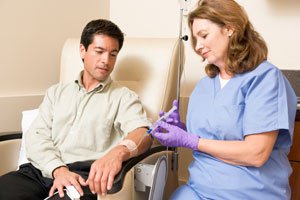Archive - Respiratory Therapists, Clinical Perfusionists, and Cardiopulmonary Technologists (NOC 3214)
If you are interested in working as a Respiratory Therapist, Clinical Perfusionist or Cardiopulmonary Technologist, you will be pleased to know that the job outlook for your occupation in Canada is extremely positive.
You can use this overview of the Canadian employment prospects in your field to start planning your immigration and settlement in Canada.
Important statistics for this occupation:
- Canada is in need of health workers across the country, as demand for health services is growing faster than the labour market can meet.
- Workers in these fields have risen sharply as a rise in respiratory illness, especially amongst seniors, and the development of outpatient care has increased across Canada.
- These fields has statistical full employment (fewer than 1% of workers in this field are unemployed)
- Immigrants make of 6% of workers in these fields, a number that is expected to grow.
- 87% of workers in these fields work in hospitals.
- Women hold about 84% of jobs in these fields.
- In Ontario, workers in these fields make on average $75,000 per year.
Duties for Occupational Therapists
Respiratory therapists assist physicians in the diagnosis, treatment and care of patients with respiratory and cardiopulmonary disorders. Clinical perfusionists provide technical support to patients undergoing cardiac surgery and patients requiring cardio-respiratory support. Cardiopulmonary technologists assist physicians in the technical aspects of diagnosis and treatment of cardiovascular and pulmonary disease. Respiratory therapists are employed in hospitals, extended care facilities, public health centres and respiratory home care companies. Clinical perfusionists and cardiopulmonary technologists are primarily employed in hospitals. Respiratory therapists, clinical perfusionists and cardiopulmonary technologists who are supervisors or instructors are included in this unit group.
Description of Main Duties
Respiratory therapists perform some or all of the following duties:
- Perform diagnostic tests, such as arterial blood gas analysis and cardiopulmonary functions tests
- Operate and monitor respiratory equipment to administer treatments such as oxygen, oxygen-air mixtures, humidified air or medications
- Operate, monitor, maintain and test a variety of diagnostic and therapeutic equipment
- Assess patients and perform or assist with interventions such as airway maintenance, line insertions, inductions and intubations
- Perform artificial respiration and external cardiac massage
- Assist with transport of high-risk patients
- Supervise and train students and other respiratory therapists
- Participate in home care programs for chronic respiratory patients and provide patient and family education
- Participate in research related to cardiac and pulmonary disorders.
Clinical perfusionists perform some or all of the following duties:
- Assemble, maintain and operate extracorporeal circulation equipment, intra-aortic balloon pumps and other heart assist devices to support or temporarily replace patients' cardiopulmonary functions during open-heart surgery
- Administer blood products, drugs and other substances through heart-lung machines and other devices as directed by cardiac surgeons and anaesthetists to maintain adequate flow of oxygenated blood to all organs of the body
- Monitor vital signs to support and maintain patients' physiological functions and metabolic needs during cardiopulmonary surgery
- Participate in routine maintenance, calibration and inspection of all perfusion related equipment
- Supervise and train student clinical perfusionists and other clinical perfusionists.
Cardiopulmonary technologists perform some or all of the following duties:
- Perform diagnostic tests, such as pulmonary function and asthma stress, or assist physicians with cardiac and cardiopulmonary stress tests and bronchoscopies
- Determine patients' blood characteristics such as activated clotting time and oxygen saturation
- Operate, monitor, maintain, calibrate and test diagnostic and therapeutic equipment
- Monitor patients and advise physician of any changes in patients' condition
- Prepare medications and administer inhaler and other treatments under supervision of cardiologist
- Provide information and care for patients during tests
- Assist with the preparation of cardiac catheterization room, prepare specialized catheters and assist cardiologists during catheterization
- Perform analysis, programming and monitoring of implanted devices such as pacemakers and defibrillators during surgery
- Supervise and train students and other cardiopulmonary technologists
- Provide technical support for research.
Example job titles for Occupational Therapists:
- Cardiopulmonary technologist
- Cardiovascular perfusion supervisor
- Cardiovascular perfusionist
- Certified clinical perfusionist (CCP)
- Chief respiratory technologist
- Clinical perfusionist
- Perfusionist
- Registered respiratory therapist (RRT)
- Respiratory therapist
- Respiratory therapy clinical instructor
Find out about salary ranges for Senior Managers in different Canadian cities with our Canada Salary Calculator.
You can start looking for a job in Canada by using our Canada Job Search Tool.


